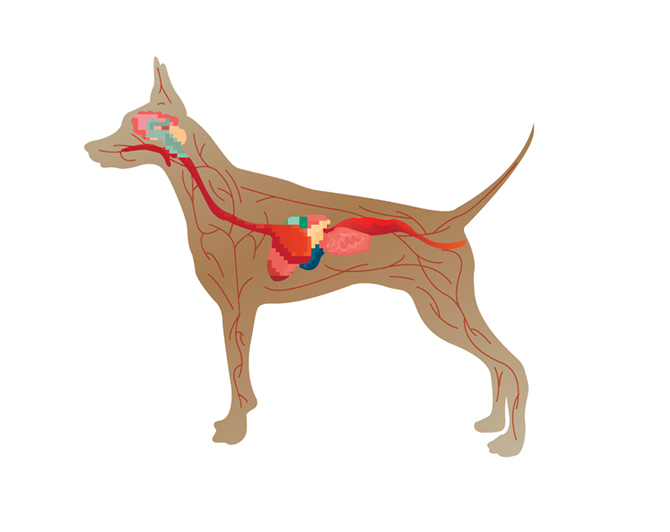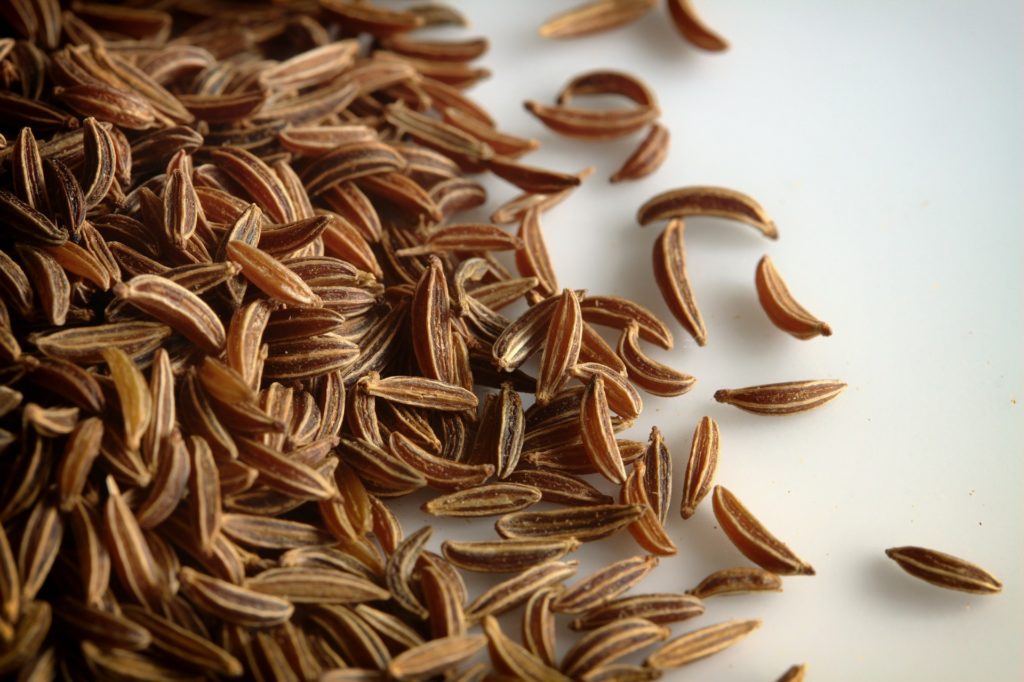For several years, the myth that black seed oil is an effective remedy against ticks for dogs has circulated in the media. But what is the truth behind this claim? How does the oil work? Could it actually be toxic to our four-legged friends? Or does it truly contain a fabulous natural remedy? Let’s find out!
Black Seed Oil for Dogs – Where It All Began
The hype around this remedy actually began in 2014 when 18-year-old Alexander Betz made an interesting observation. In the spring, the young man was surprised to find that his dog brought home hardly any ticks after their daily walks. After some thought, he attributed this development to the administration of black seed oil. The dog had been receiving it for several months to improve its allergies.
Inspired by this, Betz proposed the theory that black seed oil helps against ticks and conducted a series of experiments. He designed and built a Y-shaped vessel. In two of the ends, he placed samples of blood or sweat, one untreated and one mixed with black seed oil. In all runs, the ticks consistently avoided the blood or sweat with the oil. Therefore, it was clear: black seed oil works. This even earned the young man the “Jugend forscht” (Youth research) prize.
Natural Remedy Egyptian Black Seed Oil
Indeed, black seed oil has been used in the Orient for more than 2000 years as both a spice and a medicinal remedy. It brings many positive effects – more on that later. Originally, the black seed plant (also known as Nigella sativa) originated from West Asia but also grows in India, North Africa, or Southern Europe. However, it has nothing to do with common caraway, which is an umbelliferous plant. Black seed belongs to the buttercup family.
The valuable seeds are harvested from its fruit capsules. After drying, they are threshed to extract the grains. These are then pressed into oil through cold pressing. It is important to handle the seeds as gently as possible to preserve their beneficial ingredients. To obtain the highest quality product, 100% natural oil from Egypt (preferably organic) is always recommended.

Why is Black Seed Oil So Good?
Not every plant oil can be safely used for pets. What is good for humans can cause harm to your beloved pet. However, black seed oil is equally beneficial for dogs and their owners. The reason lies in its particularly high-quality ingredients.
Abundant in: Unsaturated Fatty Acids
To ensure your dog’s overall well-being, it is important for them to consume various substances in sufficient quantities. This includes unsaturated fatty acids. These are involved in almost all metabolic processes and are essential for the organism. Prostaglandins are formed from them in the body, which support various areas: from brain performance to nerve function, and from the immune system to the hormone system – they all benefit equally.
This general strengthening also reduces the risk of conditions such as coronary heart disease. By the way: if your dog is allergic, they usually suffer from a specific enzyme deficiency, which means that the important prostaglandins cannot be produced sufficiently. To compensate for this deficiency, affected animals need to consume significantly more unsaturated fatty acids. In these cases, a product like black seed oil is ideal, as it consists of about 80% of these beneficial components.

Just Enough: Essential Oils
They are a double-edged sword. On one hand, the essential oils of black seed have antioxidant, disinfectant, and antifungal effects. They also bring along, among others, thymoquinone, which in the right dosage (as naturally present here) can reduce allergic symptoms.
On the other hand, many animals react allergically to essential oils. It’s important that they should not be too intense, otherwise they harm the animal. Black seed oil consists of only just under 1% of these components and is therefore very well tolerated, even for dogs. Other animals, such as cats, should not receive such oil, as they cannot metabolize it and it would only harm them.
A Colorful Variety: Vitamins and Minerals
What the body can always use are nutrients. Black seed oil provides large amounts of various vitamins and valuable minerals that can support the dog’s body in many ways.
- Beta-carotene: promotes the immune system, cells, eyes, and a healthy coat
- Biotin: supports metabolism, ensures a beautiful coat, and good skin
- Folic acid: stimulates cell metabolism and the production of red blood cells
- Magnesium: promotes healthy nerve and muscle function, as well as a stable energy metabolism
- Selenium: supports the body’s cell protection, promotes detoxification
- B vitamins (B1, B2, B6): important for metabolism, nerves, brain function, promotes mental balance
- Vitamin C: serves as a strong antioxidant for cell protection, strengthens the immune system, and promotes the utilization of iron from food
- Vitamin E: regulates, among other things, blood clotting
Good to Have: Additional Ingredients
But that’s still not enough. Because black seed oil has some other valuable components that can benefit the dog. Foremost among these is a very high content of all essential amino acids that the organism needs. They are part of protein production, hormone synthesis, enzyme formation, and ensure a functional metabolism.
In addition, the oil also provides saponin melanthin and (after longer storage) oligocondensation products such as nigellon semohiorpion. These components have a positive effect on the respiratory tract. The former has an expectorant and cleansing effect, the latter supports in asthma or spasmodic cough attacks.
Black Seed Oil for Dogs – Areas of Application
Based on the many nutrients and valuable components, you can already get a small impression of how diverse the positive effects of black seed oil for dogs can be. In the following, we want to provide you with a condensed overview of cases where the remedy can particularly well support.
Deterrence of Parasites
This is where it all started, and this problem is probably omnipresent for every dog owner. Because pests like ticks are not only annoying but actually dangerous. After a tick bite, your dog can become infected with the life-threatening Lyme disease. So it’s better to keep the parasites at bay. Since ticks notoriously dislike the smell of the oil, this usually succeeds quite well, thankfully. The effect also applies to fleas. However, the oil can only be used preventively.
Alleviation of Allergies
Similar to humans, dogs can also develop various allergies and intolerances. Whether it’s against mites, pollen, or food components (e.g., gluten) – they can all trigger allergic reactions. Itching, coughing, and respiratory diseases are just some symptoms, all caused by an overreaction of the immune system. The prostaglandins formed by black seed oil can harmonize this imbalance, thus weakening the allergy overall.

Support for Seizures, Joint Pain, and More
Animals can also suffer from diseases such as epilepsy. In addition to some classic preparations, black seed oil has also proven to be effective in these cases. The thymoquinone contained in it has a similar effect and can thus reduce symptoms and the frequency of seizures. However, application should ideally be discussed with the veterinarian. A combination of classical antiepileptic drugs and natural preparations is often particularly efficient.
Another frequently relevant issue in the dog’s body is the musculoskeletal system or its restriction due to conditions such as rheumatism or arthritic diseases. Since black seed oil also has antioxidant properties, it can improve such inflammatory processes. Especially for older dogs, administering the oil can have a positive effect on the musculoskeletal system and the resulting joint pain.
For Beautiful Fur and Healthy Skin
As mentioned earlier, the oil also has a slight disinfectant effect due to its essential components. Therefore, it can be used to treat minor superficial skin injuries and support healing. At the same time, a nurturing effect occurs. This can also benefit the coat. Used sparingly, the oil provides a silky shine.

Proper Application of Black Seed Oil
If you want to provide your dog with the many good properties of this natural product, the question of the correct application naturally arises. This means, on the one hand, how the oil is best administered, and on the other hand, how often.
Suitable for External and Internal Use
The beauty is that depending on your goal, you can administer black seed oil both orally and topically. If you’re concerned with parasite repellent or skin and coat care, external application is recommended. Simply apply a few drops to the back of the neck, so the scent is evenly distributed over the body. Massaging a small amount of oil (often just 1 drop is enough) into the fur with a brush is also effective.
To ensure your dog benefits from the many nutrients, internal use should be the focus. You can, for example, drop the oil into the water. However, in this case, you don’t have full control over whether and how much of the substance your pet has ingested, especially if multiple dogs live in the household. Additionally, some pets may dislike the smell and therefore refuse to drink the liquid altogether. That’s why mixing the oil into the food is often a better option.
What is the right dosage?
When it comes to the question of how much and how often black seed oil should be administered to dogs, opinions differ somewhat. While some indeed recommend daily use, others believe that intermittent administration every 2-3 weeks is better. There are also different approaches regarding the quantity. Some experts suggest the rule of thumb that one milligram of oil should be administered per kilogram of body weight. So, if your dog weighs 15 kg, he would receive 15 milligrams of black seed oil accordingly.
Another approach would be as follows:
- Small dogs: 1-2 drops in food
- Medium-sized dogs: 3-6 drops in food
- Large dogs: 7-8 drops in food
Many also recommend this approach. In case of doubt, it’s better to start with a smaller amount of oil rather than giving too much. Additionally, consulting your veterinarian is advisable. They can provide basic tips on the application of black seed oil tailored to your pet.
What else to consider during application
Actually, administering black seed oil is relatively harmless. There are only two important exceptions where it should not be used. Firstly, this applies to pregnant bitches, as the contained essential oils can promote miscarriage. Secondly, dogs with liver disease or those regularly receiving pain medication should also not necessarily consume black seed oil.
The reason for this is that the contained essential oils or the substances terpenes and phenols must be metabolized by the liver. However, if the liver is already burdened by a disease or other medications, it may not be able to perform this task. The organ fails, and the body can no longer detoxify itself.
Apart from that, no significant side effects are known. If the oil is massively overdosed, it can sometimes lead to nausea, diarrhea, and other stomach discomfort or digestive problems. In these cases, the administered amount should be reduced. If in doubt, you can also consult your veterinarian again. But if there are no pre-existing conditions and the dosage is appropriate for the animal, then black seed oil for dogs is indeed a great thing!


